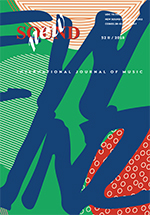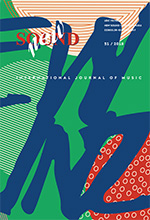Issue No. 30
Composer Speaks
Jelena Novak – SOUND TIDE. CONVERSATION WITH MIGUEL AZGUIME
Download: ser / eng
Core Issue: Studies, Interpretations, Views, Research and Tradition
Tijana Popović Mlađenović – THE STORY OF THE BALLAD IN MUSIC
Abstract: The history of the ballad in music is shaped into ‘chapters’ based on different fabulae; the multiple and often incomplete fragmentary fabulae of this (hi)story which suggest polysemy and ambiguity. The episodic fabula of the overall narrative history of the ballad (from the middle ages to date) originates from a proto-story of a song that was sung to the accompaniment of dance. The unique proto-narrative ‘envelope’ of the ballad is repeated in different places and contexts, and variously transformed in the historical passage of time through (western-European) folklore, popular and art music, and, moreover, in the creating, shaping, interpreting and experiencing of (western-European) music time.
Keywords: the proto-narrative of a ballad, music ballad, ballad as a notated polyphonic composition, instrumental ballad, music time, multiple and incomplete fabulae of the (hi)story of the ballad, polysemy and ambiguity, diegetic and mimetic, temporal distance and performativity.
Download: ser / eng
Sanja Radinović – SERBIAN FOLK BALLADS AND ETHNOMUSICOLOGY. A MISSION IMPOSSIBLE
Abstract: Narrative songs, whose fundamental characteristic is a melostrophe that is variable in terms of its length and formal structure, have so far remained on the margin of serious examinations in Serbian ethnomusicology – most likely due to their paucity and unfixed musical-formal and melodic-rhythmic structure. Following a brief outline of the history of research into Serbian narrative songs, this study deals with the question of their origin and offers a proposal for their typology, based on the author’s analytical-comparative analysis of all published examples. A discussion of terminology and genres concludes this paper and sheds light on the reasons why examinations of Serbian folk ballads relying on the genre as a poetic rather than functional or music category cannot be a precondition for valid scientific results.
Keywords: ballads, narrative songs, macro-form, variable melostrophe, dramaturgy of narrative content, melodized declamation, gusle epic, improvisation, genres, terminology.
Download: ser / eng
Marjetka Golež Kaučić – THE SLOVENIAN FOLK BALLAD: A GENRE ENIGMA
Abstract: This article discusses the ballad as one of the most enigmatic genre structures in both Slovenia and Europe as a whole. The Slovenian ballad is presented within the international context, along with analysis and synthesis of its fundamental textual, musical, and contextual characteristics.
Keywords: Slovenian ballad, folk, literary, European balladry, typology, themes, motifs, text, texture, context, melody, metric and rhythmic structure, genre.
Download: ser / eng
Anne Caufriez – PORTUGUESE BALLAD, ITS SPECIFICITIES AND OFFSHOOTS IN THE MEDITERRANEAN
Abstract: Romance, or in Portugal romanceiro (collection of songs), is traditional poetry of medieval origin. It is particularly well preserved on the plateau of Trás-os-Montes in the northeast of the country. Characteristic of the rural environment, this ballad is particularly performed as part of certain agricultural work. Its melodies depend on the function of the song in social life. These ballads form part of a large repertoire, whose counterparts can be found across the European part of the Mediterranean.
Keywords: Romanceiro, romance, epic poem, Trás-os-Montes, Renaissance poets, thematic cycles, communitarianism, harvest, ritual hours, syllabic melodies, Mediterranean ballad.
Download: ser / eng
Chris Walton – OTHMAR SCHOECK’S CHORAL BALLAD DER POSTILLON, AND HOW NOT TO WRITE AN OPERA
Abstract: Othmar Schoeck’s choral ballad Der Postillon of 1909 was a compromise for a composer still ill-at-ease with large-scale forms. Its lyrical element allowed his song-writing gift to flourish, while its more dramatic moments acted as a testing-ground for his operatic ambitions.
Keywords: Othmar Schoeck (1886-1957), Der Postillon, ballad, Hermann Hesse, Nikolaus von Lenau, choral music.
Download: ser / eng
Jim Samson – EXPLORING CHOPIN’S ‘POLISH BALLADE’
Abstract: Each stage of the source chain of Chopin’s Op. 38 is described. Theories of genre are discussed. Late nineteenth-century descriptions are related to intertextual associations to produce a hermeneutical reading of the work.
Keywords: Source chain, genre, topos, narrative, intertext, extramusical.
Download: ser / eng
Vesna Mikić – THE FIRST AND THE LAST – ZDRAVKO ČOLIĆ – THE ‘GURU’ OF POP BALLAD
Abstract: The paper addresses the distinctive features of the pop ballad in the context of former Yugoslavia’s popular music. Zdravko Čolić’s long career, which ‘covers’ almost the complete history of popular music in ex-Yu space, was the ideal ballad repertoire to be surveyed. Since most of these ballads were written exclusively for the singer, insight into the author’s achievements in the domain of (Yugoslav) pop ballad is addressed, as well.
Keywords: pop ballad, popular music, Zdravko Čolić, SFRJ, Kornelije Kovač, Goran Bregović, performativity of popular music.
Download: ser / eng
Miloš Krstić – JAZZ STANDARDS OF A BALLAD CHARACTER
Abstract: In order to improvise, jazz musicians use small form themes often taken from musicals and movies. They are mostly interested in harmonic improvements of the ballads, fitting them into the jazz language. Due to extraordinary individual recordings, some of these ballads have become known as ‘standards’ with contributions by performers such as Hawkins, Coltrane, Gillespie, Davis and Powell, and are now commonly performed from memory.
Keywords: jazz, ‘standard’, ballad, composer, improviser, form, harmony, changes, tritone, cadence.
Download: ser / eng
New Works
Dragana Jeremić Molnar – ANOTHER CONTEMPORARY CONTRIBUTION TO THE CONTEXTUALIZATION OF THE PASSACAGLIA. About Jugoslav Bošnjak’s work Sinfonia – passacaglia
Abstract: The reason for this analysis of the work Sinfoniа – passacagliа, one of Jugoslav Bošnjak’s (1954) latest works, was its premiere in 2007. In terms of style, compositional technique and genre, this one-movement orchestral composition proves the author’s loyalty to the creative poetics he began to build in the early 1990s. It confirms Bošnjak’s devotion to orchestral sound, his skill in exploiting the expressive resources of this medium, virtuosity in using and correlating instrumental colours, and determination to create communicative music. The author of this text particularly focuses on the way in which compositional procedures paradigmatic of the passacaglia have been combined with procedures typical of symphonic thought and symphonic style.
Keywords: Jugoslav Bošnjak, Sinfoniа – passacagliа, orchestral music, variation principle, passacaglia.
Download: ser / eng
Analysis
Miloš Zatkalik – BERISLAV POPOVIĆ: A BALLAD ABOUT LOST TONALITY
Abstract: The composition greatly ‘defies’ the usual formal, syntactic or harmonic analysis, but the logic of the musical development is best analysed by looking at the interaction of several music parameters. Although this logic is first and foremost a musical one, certain narrative strategies can be seen to have parallels in the poetic genre of the ballad.
Keywords: ballad, narrativity, quest, parameter, polyassociation, tonality.
Download: ser / eng
Students' Papers
Jelena Gligorijević – A SEMIOLOGICAL ANALYSIS OF THE SONG MOLITVA
Download: ser / eng
Festivals and Symposia
Mirjana Zakić – REVIEW OF THE39TH CONFERENCE OF ICTM. Vienna, July 4–11, 2007
Download: ser / eng
Mirjana Veselinović-Hofman – ’’PASSAGEN – TRANSITIONS’’. 18TH INTERNATIONAL CONGRESS OF INTERNATIONAL MUSICOLOGICAL SOCIETY. Zurich, 10–15 July 2007
Download: ser / eng
Reviews
Sonja Marinković – VLADAN RADOVANOVIĆ: SINTEZIJSKA UMETNOST (SYNTHESIC ART). Kragujevac, Narodni muzej, 2005, 208, with illustrations (29cm)
Download: ser / eng
Sonja Marinković – DRAGANA JEREMIĆ-MOLNAR: SRPSKA KLAVIRSKA MUZIKA U DOBA ROMANTIZMA, 1841-1914 (SERBIAN PIANO MUSIC IN THE EPOCH OF ROMANTICISM, 1841-1914). Novi Sad, Matica srpska, 2006, 299
Download: ser / eng
Marija Masnikosa – WAGNER’S BOOK OPERA AND DRAMA TODAY
Download: ser / eng
Miško Šuvaković – ON PERFORMING. From ONTOLOGY to PERFORMATIVITY in and on MUSIC
Download: ser / eng
Dimitrije O. Golemović – LAURENT AUBERT: THE MUSIC OF THE OTHER. XX Century Library and bookstore The Circle (editor: Ivan Čolović), Belgrade 2007
Download: ser / eng
CD Reviews
Ana Kotevska – THE SOUND CHRONICLE OF WARSAW AUTUMN 2005. The 48th International Festival of Contemporary Music on Compact Discs. Publishers: Polish Composers’ Union and Polish Music Information Centre
Download: ser / eng
Defended Theses
Tijana Popović Mlađenović – THE PROCESSES OF PAN-STYLISTIC MUSICAL THINKING
Download: ser / eng
Mirjana Zakić – THE RITUAL SONGS OF THE WINTER SEMESTER – THE SYSTEM OF SOUND SIGNS IN THE SOUTH-EASTERN SERBIAN TRADITION
Download: ser / eng
Sanja Radinović – THE LAWS OF MELOPOETIC SHAPING OF SERBIAN FOLK SONGS AS A BASIS FOR THE METHODOLOGY OF FORMAL ANALYSIS
Download: ser / eng
New Sound CD No. 30
1. Miguel Azguime: Le Dicible Enfin Fini, electroacoustic music
2-3. Sound examples of Serbian folk ballads: Što se ono na planin’ beleje; Zadade se crni oblak
4-6. Sound examples of Portuguese ballads: Indo-me (eu) por at abaixo; Frei João; Don Fernando
7-8. Sound examples of jazz ballads: This Foolish Things; Smoke Gets in Your Eyes
9. Jugoslav Bošnjak: Sinfonia – Passacaglia, for symphonic orchestra
10. Berislav Popović: Ballad, for string orchestra


